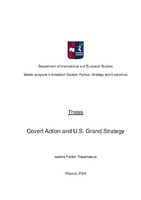Covert Action and U.S. Grand Strategy

Master Thesis
Συγγραφέας
Theocharous, Ioannis
Θεοχάρους, Ιωάννης
Ημερομηνία
2024Προβολή/
Λέξεις κλειδιά
Covert ActionΠερίληψη
In the last seventy years, the United States had to deal with numerous threats to its superiority and national security. The dangers of starting another World War, now with nuclear weapons at stake, has limited each U.S. governmental administration’s options for overt and open-warfare operations. Additionally, the limits implied by the projection of a Democratic state, with liberal values and morality that faced vicious enemies, and the need of uniting the world against them, called for an increased use of covert actions as a mean to meet ends, that couldn’t be done overtly. Covert Action was and is used, as a policy tool, to accomplish a state’s shorter-term foreign policy and the longer-term Grand Strategy. The U.S. governments undertook much of their covert operations in the developing world, with successful and failed coups, boycotted elections, sabotages, support for paramilitary action and many more. Ambiguous results fill the academic literatures wherever these operations succeeded in their objectives, or what were their longer-termed results. Did the Covert Action applied helped achieve the U.S. Grand Strategic goals? Did the Decision-makers follow the designated Strategy or did they approved operations based on the self-security that the word “covert” provides? For sure, covert action operations achieved most of their stated objectives but at what cost? Did their long-term effects create more problems than they solved in the short-term? Examination of various, successful and not, covert U.S. operations reveal that Covert Action, while it may achieve the short-term foreign policy of each administration, its effectiveness is ambiguous when it comes in achieving the overall Grand Strategy.


